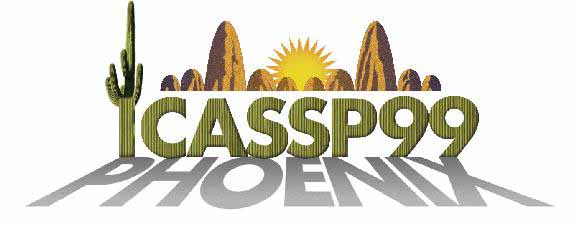Mirror Sites
General Information
Confernce Schedule
Technical Program
| Plenary Sessions | |
| Special Sessions | |
| Expert Summaries | |
| Tutorials | |
| Industry Technology Tracks | |
| Technical Sessions |
Tutorials
Industry Technology Tracks
Exhibits
Sponsors
Registration
Coming to Phoenix
Call for Papers
Author's Kit
On-line Review
Future Conferences
Help
Afternoon Tutorial 4 |
 |
Robust Automatic Speech Recognition for Unknown Environment Compensation
Jean-Claude JunquaSpeech Technology Laboratory
This tutorial summarizes the main difficulties encountered in Automatic Speech Recognition (ASR) when the type of communication channel is not known. This problem is crucial for the development of successful applications in promising domains such as computer telephony and cars. The main technical problems encountered are due to the speaker (e.g. speaking style, Lombard reflex, vocal tract geometry), the use of microphones with different degrees of spectral slope, the variable quality of the support channels (e.g. telephone channels are noisy and have different characteristics), the reverberation and echoes, the variable distance and direction to the microphone introduced by hands-free recognition, and the ambient noise which distorts the input speech signals.
This tutorial will present these distortions along with their influence on automatic speech recognition. It will also present solutions currently in use in state-of-the-art ASR systems including feature and model-based compensation along with speaker adaptive techniques. Finally, it will highlight some promising directions (e.g. characterization of the recognizer sensitivity to the source of distortion, use of a priori knowledge) for future research.
About the Tutorial Speaker
Jean-Claude Junqua received his Engineer degree (1980) from ENSEM (France) in Electronics and Automation, his Master and Doctorate degrees (in 1981 and 1989, respectively) and the "Habilitation a diriger des recherches" (1993) from the University of Nancy I (France) in the field of Computer Science. From 1981 to 1986 he was responsible of the computer facilities of CRIN (Research Center in Computer Science of Nancy, France). From 1987 to 1988 he was visiting researcher at Speech Technology Laboratory in Santa Barbara, California. In 1989, he joined Speech Technology Laboratory. From April 1992 to August 1993 he was visiting researcher at Matsushita, Osaka, Japan. Currently heading the speech recognition group and Group Director at Speech Technology Laboratory, his work has concentrated on improving robustness of automatic speech recognizers for small to medium size vocabularies. His current interests cover all aspects of automatic speech recognition, e.g. the study of noisy Lombard and channel distorted speech recognition, context-dependent phone modeling, and the design of dialogue systems. He is the author of more than 100 articles or patents in the above areas along with a recent book entitled "Robustness in Automatic Speech Recognition". He served as a chairman at several International conferences and participated to various International scientific committees. In 1992 and 1997 he co-organized two ESCA workshops entitled, respectively, "Speech Processing in Adverse Conditions" and "Robust Speech Recognition for Unknown Communication Channels". He is currently in the Editorial Board of the Speech Communication Journal, Associate Editor of the IEEE Transactions on Speech and Audio Processing, and member of IEEE and ESCA.
< Return to overview of Tutorials.
| Last Update: February 4, 1999 Ingo Höntsch |
|